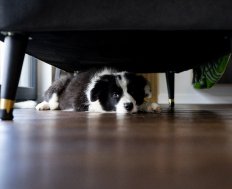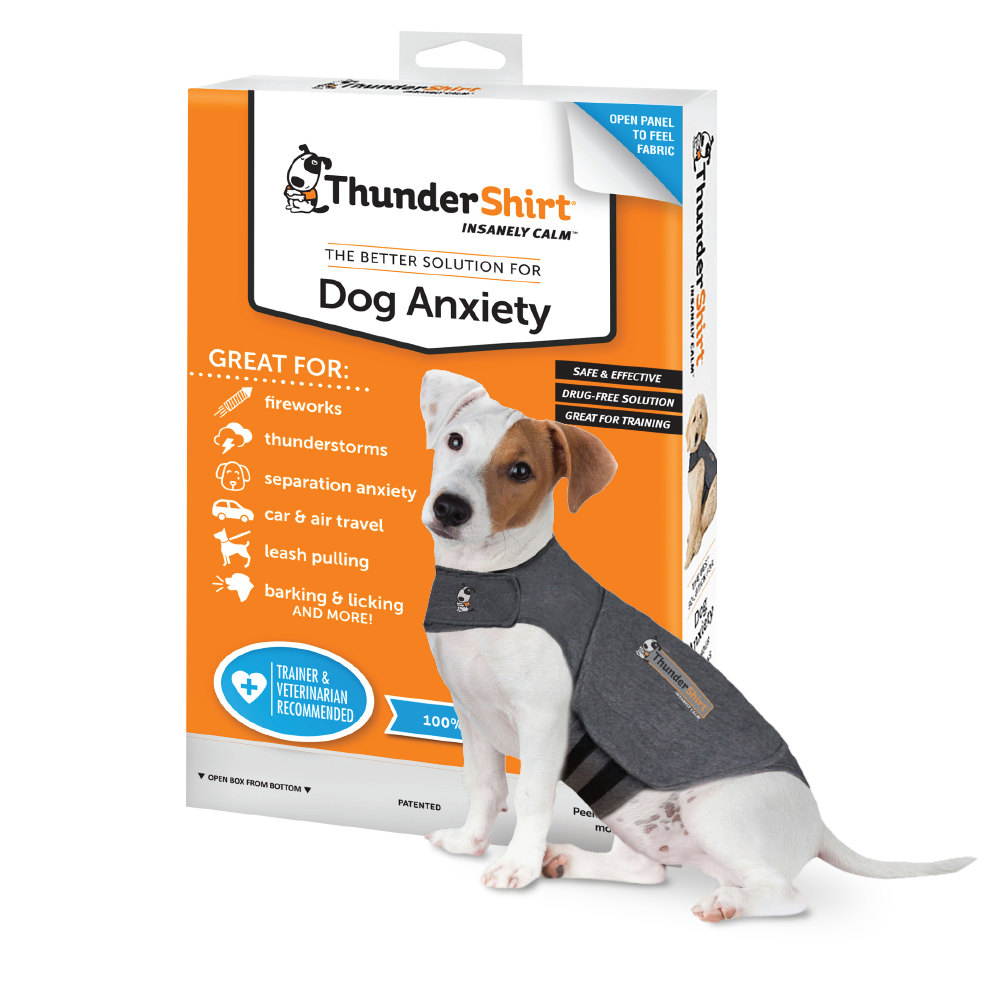Want to subscribe to our blog?
Dogs are sociable animals and love company. But as much as we might want to, we can’t always spend every moment together. After all, what happens when you go on holiday or need to travel for work? In this blog we’ll be answering the popular question: can you leave a dog alone overnight? Keep reading for our advice!
Can You Leave A Dog Alone Overnight?
It’s always good practice that your dog or puppy learns to be home alone for a period of time. This is an essential part of their development and can help to prevent separation anxiety in dogs from becoming a future issue.
That said, it’s not advisable to leave dogs or puppies alone for long periods. This includes leaving dogs alone overnight.
Many dogs feel worried when they are left on their own, especially if they have been used to having company. These are the main points to consider when determining how long is suitable to leave your dog alone:
- Their age
- Their temperament
- How long they can wait to toilet
- Their routine
- Any health conditions
- Are they nervous about unusual noises
Generally speaking, young puppies can be left alone for up to 2 hours, but this has to be built up gradually with the right training. Dogs over 18 months old meanwhile can be left a little longer, up to 4 hours. Just remember that this will vary from dog to dog.
When your dog reaches its senior years, the length of time they can be left alone will very much depend on their health. In general, it could be between 2-6 hours.
Tips For Leaving Dogs Home Alone For Short Periods
- When you are planning to be away for any length of time, make sure your dog gets plenty of exercise before you leave.
- Ensure your dog has been to the toilet – this will help them to settle when you are not there.
- Leave plenty of water, along with their favourite chews, toys, or a food puzzle to keep them occupied if they get bored.
- Consider leaving the radio or TV on, or put on a calming video.
- If your dog is prone to barking at people or other dogs passing the window, it might be an idea to close the curtains on those windows.
- Consider setting up a pet camera to allow you to check on your dog when you are not there. Some systems allow you to talk to your dog and dispense treats or toys. Just bear in mind that some dogs may find hearing your voice confusing if they cannot see you.
Used regularly, an ADAPTIL Calm Diffuser can help your dog stay calm and adapt to situations like staying alone. This pheromone plug in for dogs creates a reassuring environment at home and continuous use will provide constant comfort for your dog.
Alternatives to leaving your dog alone overnight
Tips For Leaving Dogs Home Alone - A dog sitter
If you are unable to take your dog with you overnight, consider engaging a dog sitter to look after them when you are away. This could be a friend, a neighbour or a family member but you should ensure that they meet a few times before you leave so that they can get to know each other, the sitter will learn your dog's routine (including how to give them medication, if necessary) and you will be able to see how they interact.
Some sitters will offer to take your dog to their home, which can work very well once your dog gets used to a different environment. Either way, always leave them with a list of emergency contact numbers, including the vet.
Tips For Leaving Dogs Home Alone - a local dog kennel
Some dogs see their local kennel as a home-from-home and they know what to expect when visiting there. If your overnight absences are fairly frequent, it could be a good option to introduce your pooch to a local kennel when they are young so that they become familiar with it, and they will also learn that you will come and collect them when you return.
Signs that your dog is not coping with being left alone
Some dogs cope well with being left alone, but others might not. Always keep a watch out for signs of separation related problems in your dog, which could include:
- Panting and/or salivating
- Barking or whining when you leave
- Pacing, restlessness, chewing at door frames, scratching carpets or jumping up at windows looking for an exit
- Toileting in the home
When you return, signs of a nervous dog may include them becoming very excitable! They might also follow you wherever you go in the house. While it is tempting to make a fuss of them, try to remain passive when you return to reassure them that you leaving is normal and nothing to be concerned by. You can then reward them when they are calm.
With practice and training, it is possible to help an anxious dog recognise that you will return home, and that a calm response to your return is ok!
To help a nervous dog who may be struggling when left home alone, start small, leave them in a room where you know they’ll feel relaxed for a short period of time. You can then increase this gradually to going out the front door for a very short time before returning, building the length of absence over time.
Make the most of practice runs that incorporate things you would do as part of your usual departure. For example, picking up your keys, putting on your coat and shoes, and so on. This can also help you determine which step is particularly worrying for your dog, so you can then adapt your training appropriately.
Remember to work at a pace that your dog is comfortable with during training. Always reward them for staying calm, and gradually build up to a point where they are comfortable staying at home without you. At the same time, it’s important not to leave your dog for any longer than you’ve successfully trained them to be alone. This is a common issue that can be surprisingly detrimental to your dog’s training!
Lastly, remember to only reward a calm response in training. If your dog becomes overexcited or nervous, stop the session. You can always try again with an earlier step when they are happy and calm!
Would you like to stay up to date with our latest guides, Q&As, tips, and advice? Consider signing up for our newsletter! Or if you’d like further help with a nervous dog, or are interested in advice on using ADAPTIL Calm Diffuser, please get in touch. We’re always interested in hearing more about your dogs’ situations.
Following our expert tips will help to ensure your bond with your dog goes from strength to strength.
Make sure to join our community for weekly advice from our dog behaviour experts as well as product offers and competitions.
 Related Posts
Related Posts
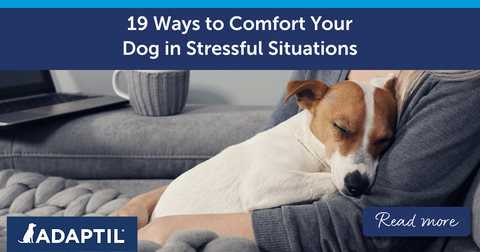
19 Ways to Comfort Your Dog in Stressful Situations
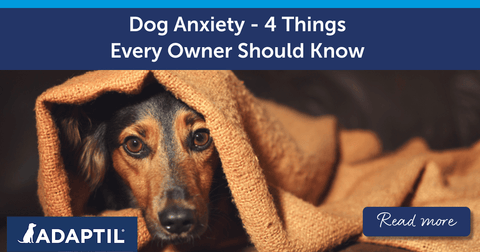
Dog Anxiety – 4 Things Every Owner Should Know
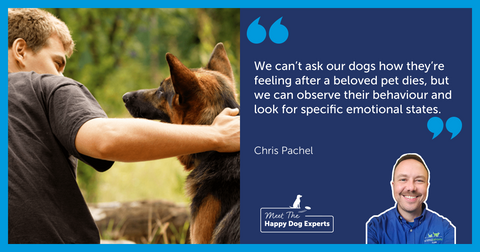
Happy Dog Expert: Help A Dog With Grief

Traveling With A Puppy In A Car
You consent to the processing of your personal data to receive our newsletters, you can unsubscribe at any time. To find out more about how your personal data is managed and to exercise your rights, please refer to the data privacy policy. Please visit this page.


